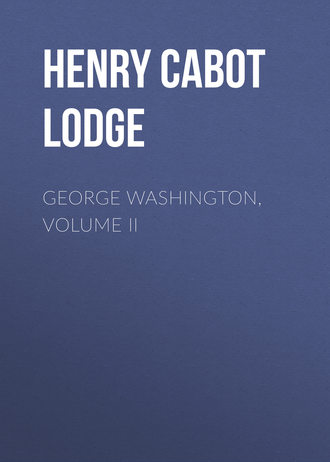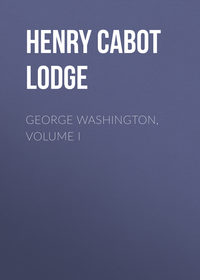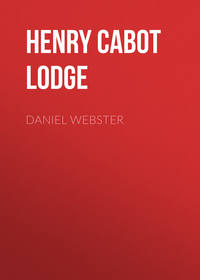 полная версия
полная версияGeorge Washington, Volume II
As Secretary of State, the head of the cabinet, and in charge of our foreign relations, he had, according to Fauchet's dispatch and to his own admissions, entered into relations with a foreign minister which ought to have been as impossible as they were discreditable to an American statesman. That Fauchet believed that Randolph deceived him did not affect the merits of the case, nor, if true, did it excuse Randolph, especially as everybody with whom he was brought into close contact seems at some time or other to have had doubts of his sincerity. As a matter of fact, Randolph could find no defense except to attack Washington and discuss our foreign relations, and his biographer has followed the same line. What was it then that Washington had actually done which called for assault? He had been put in possession of an official document which on its face implicated his Secretary of State in the intrigues of a foreign minister, and suggested that he was open to corruption. These were the views which the public, having no personal knowledge of Randolph, would be sure to take, and as a matter of fact actually took, when the affair became known. There was a great international question to be settled, and settled without delay. This was done in a week, during which time Washington kept silent, as his public duty required. The moment the treaty was signed he handed Fauchet's dispatch to Randolph and asked for an explanation. None knew of the dispatch except the cabinet officers, through whom it had necessarily come. Washington did not prejudge the case; he did not dismiss Randolph with any mark of his pleasure, as he would have been quite justified in doing. He simply asked for explanation, and threw open his own correspondence and the archives of the department, so that Randolph might have every opportunity for defense. It is difficult to see how Washington could have done less in dealing with Randolph, or in what way he could have shown greater consideration.
Randolph resigned of his own motion, and then cried out against Washington because he had been obliged to pay the penalty of his own errors. When it is considered that Washington did absolutely nothing to Randolph except to hand him Fauchet's dispatch and accept his consequent resignation, the talk about Randolph's forgiving him becomes simply ludicrous. Randolph saw his own error, was angry with himself, and, like the rest of humanity, proceeded to vent his anger on somebody else, but unfortunately he had the bad taste to turn at the outset to the newspapers. Like Mr. Snodgrass, he took off his coat in public and announced in a loud voice that he was going to begin. The President's only response was to open the archives and bid him publish everything he desired. Randolph then wrote the President a private letter, which was angry and impertinent; "full of innuendoes," said the recipient. Washington drafted a sharp reply, and then out of pure kindness withheld it, and let the private letter drop into silence, whither the bulky "Vindication," which vindicated nobody, soon followed it. The fact was, that Washington treated Randolph with great kindness and forbearance. He had known him long; he was fond of him on his own account as well as his father's; he appreciated Randolph's talents; but he knew on reading that dispatch, if he had never guessed it before, that Randolph, although honest and clever, and certainly not bad, was a dangerously weak man. Others among our public men had put themselves into relations with foreign representatives which it is now intolerable to contemplate, but Randolph, besides being found out at the moment, had, after the fashion of weak natures, gone further and shown more feebleness than any one else had. Washington's conduct was so perfectly simple, and the facts of the case were so plain, that it would seem impossible to complicate them. The contemporary verdict was harsh, crushing, and unjust in many respects to Randolph. The verdict of posterity, which is both gentler and fairer to the secretary, will certainly at the same time sustain Washington's course at every point as sensible, direct, and proper.
Only one question remains which demands a word before tracing briefly the subsequent fate of the Jay treaty, and that is, to know exactly why the President signed it. The answer is fortunately not difficult. There was a choice of evils. When Washington determined to send a special envoy, he said: "My objects are, to prevent a war, if justice can be obtained by fair and strong representations (to be made by a special envoy) of the injuries which this country has sustained from Great Britain in various ways; to put it into a complete state of military defense; and to provide eventually such measures for execution as seem to be now pending in Congress, if negotiation in a reasonable time proves unsuccessful." From these views he never varied. The treaty was not a perfect one, but it had good features and was probably, as has been said, the best that could then be obtained. It settled some vexed questions, and it gave us time. If the United States could only have time without making undue sacrifice, they could pass beyond the stage when a foreign war with its consequent suffering and debt would endanger our national existence. If they could only have time to grow into a nation, there would be no difficulty in settling all their disputes with other people satisfactorily, either by war or negotiation. But if the national bonds were loosened, then all was lost. It was in this spirit that Washington signed the Jay treaty; and although there was much in it that he did not like, and although men were bitterly divided about the ratification, a dispassionate posterity has come to believe that he was right at the most difficult if not the most perilous crisis in his career.
The signature of the treaty, however, did not put an end to the attacks upon it, or upon the action of the Senate and the Executive. Nevertheless, it turned the tide, and, as Washington foresaw, brought out a strong movement in its favor. Hamilton began the work by the publication of the letters of "Camillus." The opposition newspapers sneered, but after Jefferson had read a few numbers he begged Madison in alarm to answer them. His fears were well grounded, for the letters were reprinted in newspapers throughout the country, and their powerful and temperate arguments made converts and strengthened the friends of the administration everywhere. The approaching surrender of the posts gratified the western people when they at last stopped to think about it. The obnoxious provision order was revoked, and the traders and merchants found that security and commerce even under unpleasant restrictions were a great deal better than the uncertainty and the vexatious hostilities to which they had before been exposed. Those who had been silent, although friendly to the policy of the government, now began to meet in their turn and send addresses to Congress; for in the House of Representatives the last battle was to be fought.
That body came together under the impression of the agitation and excitement which had been going on all through the summer. There was a little wrangling at the opening over the terms to be employed in the answer to the President's message, and then the House relapsed into quiet, awaiting the formal announcement of the treaty. At last the treaty arrived with the addition of the suspending article, and the President proclaimed it to be the law of the land, and sent a copy to the House. Livingston, of New York, at once moved a resolution, asking the President to send in all the papers relating to the negotiation, and boldly placed the motion on the ground that the House was vested with a discretionary power as to carrying the treaty into execution. On this principle the debate went on for three weeks, and then the resolution passed by 62 to 37. A great constitutional question was thus raised, for there was no pretense that the papers were really needed, inasmuch as committees had seen them all, and they contained practically nothing which was not already known.
Washington took the request into consideration, and asked his cabinet whether the House had the right, as set forth in the resolutions, to call for the papers, and if not, whether it was expedient to furnish them. Both questions were unanimously answered in the negative. The inquiry was largely formal, and Washington had no real doubts on the point involved. He wrote to Hamilton: "I had from the first moment, and from the fullest conviction in my own mind, resolved to resist the principle, which was evidently intended to be established by the call of the House of Representatives; and only deliberated on the manner in which this could be done with the least bad consequences." His only question was as to the method of resistance, and he finally decided to refuse absolutely, and did so in a message setting forth his reasons. He said that the intention of the constitutional convention was known to him, and that they had intended to vest the treaty-making power exclusively in the Executive and Senate. On that principle he had acted, and in that belief foreign nations had negotiated, and the House had hitherto acquiesced. He declared further that the assent of the House was not necessary to the validity of treaties; that they had all necessary information; and "as it is essential to the due administration of the government that the boundaries fixed by the Constitution should be preserved, a just regard to the Constitution and to the duty of my office, under all the circumstances of this case, forbid a compliance with your request." The question was a difficult one, but there could be no doubt as to Washington's opinion, and the weight of authority has sustained his view. From the practical and political side there can be little question that his position was extremely sound. In a letter to Carrington he gave the reasons for his action, and no better statement of the argument in a general way has ever been made. He wrote:—
"No candid man in the least degree acquainted with the progress of this business will believe for a moment that the ostensible dispute was about papers, or whether the British treaty was a good one or a bad one, but whether there should be a treaty at all without the concurrence of the House of Representatives. This was striking at once, and that boldly, too, at the fundamental principles of the Constitution; and, if it were established, would render the treaty-making power not only a nullity, but such an absolute absurdity as to reflect disgrace on the framers of it. For will any one suppose that they who framed, or those who adopted, that instrument ever intended to give the power to the President and Senate to make treaties, and, declaring that when made and ratified they should be the supreme law of the land, would in the same breath place it in the power of the House of Representatives to fix their vote on them, unless apparent marks of fraud or corruption (which in equity would set aside any contract) accompanied the measure, or such striking evidence of national injury attended their adoption as to make a war or any other evil preferable? Every unbiased mind will answer in the negative.
"What the source and what the object of all this struggle is, I submit to my fellow-citizens. Charity would lead me to hope that the motives to it would be pure. Suspicions, however, speak a different language, and my tongue for the present shall be silent."
No man who has ever held high office in this country had a more real deference for the popular will than Washington. But he also had always a keen sensitiveness to the dignity and the prerogatives of the office which he happened to hold, whether it was that of president or general of the armies. This arose from no personal feeling, for he was too great a man ever to worry about his own dignity; but he esteemed the great offices to which he was called to be trusts, which were to suffer no injury while in his hands. He regarded the attempt of the House of Representatives to demand the papers as a matter of right as an encroachment on the rights of the Executive Department, and he therefore resisted it at once, and after his usual fashion left no one in any doubt as to his views. So far as the President was concerned, the struggle ended here; but it was continued for some time longer in the House, where the debate went on for a fortnight, with the hostile majority surely and steadily declining. The current out-doors ran more and more strongly every day in favor of the administration, until at last the contest ended with Ames's great speech, and then the resolution to carry out the treaty prevailed. Washington's policy had triumphed, and was accepted by the country.
The Jay treaty and its ratification had, however, other results than mere domestic conflicts. Spain, acting under French influence, threatened to rescind the Pinckney treaty which had just been made so advantageously to the United States; but, like most Spanish performances at that time, these threats evaporated in words, and the Mississippi remained open. With France, however, the case was very different. Our demand for the recall of Genet had been met by a counter-demand for the recall of Morris, to which, of course, we were obliged to accede, and the question as to the latter's successor was a difficult and important one. Washington himself had been perfectly satisfied with the conduct of Morris, but he was also aware that the known dislike of that brilliant diplomatist to the revolutionary methods then dominant in Paris had seriously complicated our relations with France. He wished by all fair means to keep France in good humor, and he therefore determined that Morris's successor should be a man whose friendship toward the French republic was well known. His first choice was Madison, which would have answered admirably, for Madison was preëminently a safe man. Very unluckily, however, Madison either could not or would not go, and the President's final choice was by no means equally good.
It was, of course, most desirable that the new minister should be persona grata to the republic, but it was vastly more important that he should be in cordial sympathy with the administration at home, for no administration ought ever to select for a foreign mission, especially at a critical moment, any one outside the ranks of its own supporters. This was the mistake which Washington, from the best of motives, now committed by appointing James Monroe to be minister to France. It is one of the puzzles of our history to reconcile the respectable and common-place gentleman, who for two terms as President of the United States had less opposition than ever fell to the lot of any other man in that office, with the violent, unscrupulous, and extremely light-headed politician who figured as senator from Virginia and minister to France at the close of the last century. Monroe at the time of his appointment had distinguished himself chiefly by his extreme opposition to the administration, and by his intrigues against Hamilton, which were so dishonestly conducted that they ultimately compelled the publication of the "Reynolds Pamphlet," a sore trial to its author, and a lasting blot on the fame of the enemy who made the publication necessary. From such a man loyalty to the President who appointed him was hardly to be expected. But there was no reason to suppose that he would lose his head, and forget that he was an American, and not a French citizen.
Monroe reached Paris in the summer of 1794. He was publicly received by the Convention, made an undignified and florid speech, received the national embrace from the president of the Convention, and then effected an exchange of flags with more embracings and addresses. But when he came to ask redress for the wrongs committed against our merchants, he got no satisfaction. So far as he was concerned, this appears to have been a matter of indifference, for he at once occupied himself with the French proposition that we should lend France five millions of dollars, and France in return was to see to it that we obtained control of the Spanish possessions in North America. Monroe fell in with this precious scheme to make the United States a dependency of France, and received as a reward vast promises as to what the great republic would do for us. Meantime he regarded with suspicion Jay's movements in England, and endeavored to obtain information, if not control, of that negotiation. In this he completely failed; but he led the French government to believe, first, that the English treaty would not be made, then that it would not be ratified, and finally that the House would not make the appropriations necessary to carry it into effect; and all the time he was compromising his own government by his absurd efforts to involve it in an offensive alliance with France. The upshot of it all was that he was disowned at home, discredited in France, and brought our relations with that nation into a state of dangerous complication, without obtaining any redress for our injuries.
Washington at first, little as he liked the theatrical performances with which Monroe opened his mission, wrote about him with great moderation to Jay, who was naturally much annoyed by the manner in which Monroe had tried to interfere with his negotiations. Six months later, however, Washington saw only too plainly that he had been mistaken in his minister to France. He wrote to Randolph on July 24, 1795: "The conduct of Mr. Monroe is of a piece with that of the other; and one can scarcely forbear thinking that these acts are part of a premeditated system to embarrass the executive government." When it became clear that Monroe had omitted to explain properly our reasons for treating with England, that he had held out hopes to the French government which were totally unauthorized, that he had brought on a renewal of the hostilities of that government, and that he had placed us in all ways in the most unenviable light, Washington recalled him, and appointed Charles Cotesworth Pinckney in his place. By this time too he was thoroughly disgusted with Monroe's performances, and in his letter to Pinckney, on July 8, 1796, offering him the appointment to Paris, he said: "It is a fact too notorious to be denied that the greatest embarrassments under which the administration of this government labors proceed from the counter-action of people among ourselves, who are more disposed to promote the views of another nation than to establish a national character of their own; and that, unless the virtuous and independent men of this country will come forward, it is not difficult to predict the consequences. Such is my decided opinion." He felt, as he wrote to Hamilton at the close of his administration, that "the conduct of France towards this country is, according to my ideas of it, outrageous beyond conception; not to be warranted by her treaty with us, by the law of nations, by any principle of justice, or even by a regard to decent appearances." This was after we had begun to reap the humiliations which Monroe's folly had prepared for us, and it is easy to understand that Washington regarded their author with anything but satisfaction or approval.
The culprit himself took a very different view, came home presently in great wrath, and proceeded to pose as a martyr and compile a vindication, which he entitled "A View of the Conduct of the Executive," and which surpassed in bulk any of the vindications in which that period of our history was prolific. It was published after Washington had retired to private life, and did not much disturb his serenity. In a letter to Nicholas, on March 8, 1798, he said: "If the executive is chargeable with 'premeditating the destruction of Mr. Monroe in his appointment, because he was the centre around which the Republican party rallied in the Senate' (a circumstance quite new to me), it is to be hoped he will give it credit for its lenity toward that gentleman in having designated several others, not of the Senate, as victims to this office before the sacrifice of Mr. Monroe was even had in contemplation. As this must be some consolation to him and his friends, I hope they will embrace it."
Washington apparently did not think Monroe was worthy of anything more serious than a little sarcasm, and he was quite content, as he said, to leave the book to the tribunal to which the author himself had appealed. He read the book, however, with care, and in his methodical way he appended a number of notes, which are worth consideration by all persons interested in the character of Washington. They are especially to be commended to those who think that he was merely good and wise and solemn, for it would be difficult to find a better piece of destructive criticism, or a more ready and thorough knowledge of complicated foreign relations, than are contained in these brief notes. His own opinion of Monroe is concisely stated in one of them. Referring to one of that gentleman's statements he said: "For this there is no better proof than his own opinion; whilst there is abundant evidence of his being a mere tool in the hands of the French government, cajoled and led away always by unmeaning assurances of friendship." With this brief comment we may leave the Monroe incident. His appointment was a mistake, and increased existing complications, which were not finally settled until the next administration.
Monroe's recall was the last act, however, in the long contest of the Jay treaty, and it was also, as it happened, the last important act in Washington's foreign policy. That policy has been traced here in its various branches, but it is worth while to look at it as a whole before leaving it, in order to see just what the President aimed at and just what he effected. The guiding principle, which had been with him from the day when he took command of the army at Cambridge, was to make the United States independent. The war had achieved this so far as our connection with England was concerned, but it still remained to prove to the world that we were an independent nation in fact as well as in name. For this the neutrality policy was adopted and carried out. We were not only to cease from dependence on the nations of Europe, but we were to go on our own way with a policy of our own wholly apart from them. It was also necessary to lift up our own politics, to detach our minds from those of other nations, and to make us truly Americans. All this Washington's policy did so far as it was possible to do it in the time given to him. A new generation had to come upon the stage before our politics were finally taken out of colonialism and made national and American, but the idea was that of the first President. It was the foresight and the courage of Washington which at the outset placed the United States in their relations with foreign nations on the ground of a firm, independent, and American policy.
His foreign policy had, however, some immediate practical results which were of vast importance. In December, 1795, he wrote to Morris: "It is well known that peace has been (to borrow a modern phrase) the order of the day with me since the disturbances in Europe first commenced. My policy has been, and will continue to be while I have the honor to remain in the administration, to maintain friendly terms with, but to be independent of, all the nations of the earth; to share in the broils of none; to fulfill our own engagements; to supply the wants and be carriers for them all; being thoroughly convinced that it is our policy and interest to do so. Nothing short of self-respect and that justice which is essential to a national character ought to involve us in war; for sure I am, if this country is preserved in tranquillity twenty years longer, it may bid defiance in a just cause to any power whatever; such in that time would be its population, wealth, and resources."
He wanted time, but he wanted space also for his country; and if we look for a moment at the results of his foreign policy we see clearly how he got both. The time gained by peace without any humiliating concessions is plain enough. If we look a little further and a little deeper, we can see how he compassed his other object. The true and the first mission of the American people was, in Washington's theory, the conquest of the continent which stretched away wild and silent behind them, for in that direction lay the sure road to national greatness. The first step was to bind by interest, trade, and habit of communication the Atlantic States with the settlements beyond the mountains, and for this he had planned canals and highways in the days of the confederation. The next step was to remove every obstacle which fettered the march of American settlement; and for this he rolled back the Indian tribes, patiently negotiated with Spain until the Mississippi was opened, and at great personal sacrifice and trial signed the Jay treaty, and obtained the surrender of the British posts. When Washington went out of office, the way was open to the western movement; the dangers of disintegration by reason of foreign intrigues on the frontier were removed; peace had been maintained; and the national sentiment had had opportunity for rapid growth. France had discovered that, although she had been our ally, we were not her dependants; other nations had been brought to perceive that the United States meant to have a foreign policy all its own; and the American people were taught that their first duty was to be Americans and nothing else. There is no need to comment on or to praise the greatness of a policy with such objects and results as these. The mere summary is enough, and it speaks for itself and for its author in a way which makes words needless.





